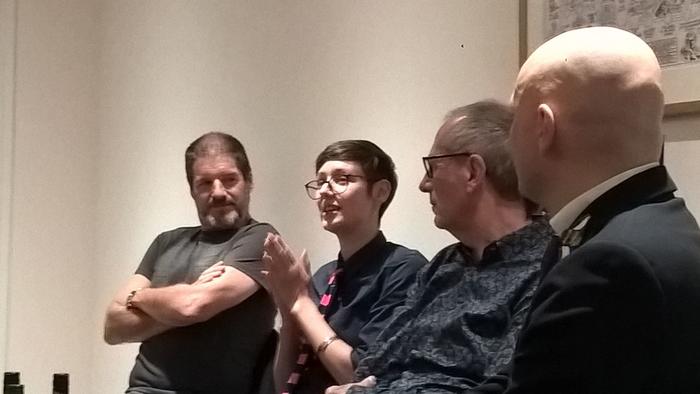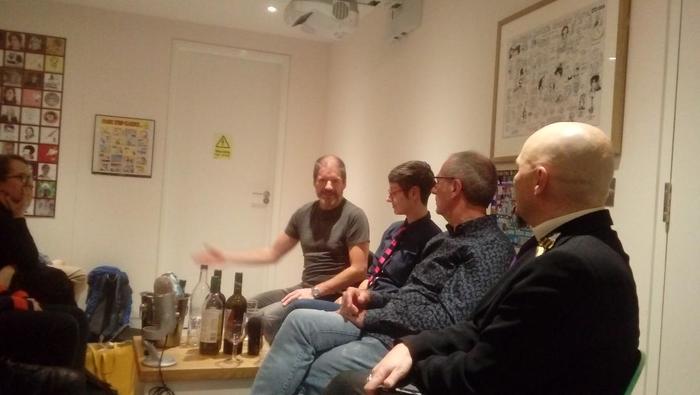London's Cartoon Museum recently played host to a unique gathering of current Comics Laureate Hannah Berry and past holders Dave Gibbons and Charlie Adlard. All three were able to look back on how the post has evolved since it was launched by the Lakes International Comic Art Festival in partnership with Lancaster University, and their very different experiences of being the laureate.
Dave Gibbons, the first ever Laureate, kicked the evening off with a little bit of background on how the role came about and how he got involved in it.
"It sounded like a good, fun thing to do, he told the audience. "I wanted to use the role to promote comics reading in schools."
Interviewed by Jason Atomic, the panel the reflected on that eternal question – did comics help you learn to read?

Hannah Berry was reading Bill Watterson's Calvin & Hobbes and was impressed by how smart Calvin was and how impressive (for a young kid) his vocabulary was. Charlie Adlard was introduced to Marvel UK's Mighty World of Marvel #1 back in 1972 when he was six, and also started reading the Asterix books at around the same time.
Dave Gibbons, on the other hand, had been taught to read before he even got to school! This is perhaps less surprising when you consider the love of reading for fun that his parents had (his dad loved US sci-fi pulp stories and his mum loved The Magnet) - and so he just always associated reading with pleasure and recognised that comics are a great entry point into that lifelong love of reading that’s so important.
Reading for fun is harder in the Adlard house of today, as one of Charlie’s children is badly dyslexic. However, that proved to be the driving force behind what Charlie wanted to achieve as Laureate, as he’d seen that going to school was actively discouraging his son from reading!
In fact, the first time he willingly picked up a book was when he was seven or eight, and, while at a signing event with his dad, Charlie politely suggested to London's Forbidden Planet store manager that the least he could do for the artist, having signed all those Walking Dead comics, was to allow his son a few free comics.
His son picked up a copy of Adventure Time and read it - so, for Charlie more than the others, being Laureate was a opportunity he took very personally.
Quizzed on what they actually done as Comics Laureate, the panel revealed there rather different experiences. Dave got on Radio 5 and went to see the Culture Editor of The Sun newspaper, who despite his unlikely job title, still wanted to run a story based on twisting Dave’s words around.

Attending a conference of teachers and librarians, Dave recalled he was impressed to see that comics were considered a welcome addition to a school.
What attending educators really wanted to know was what was appropriate for each age group to read, Dave recounted. They didn’t need convincing about comics they just wanted some advice.
(You may, incidentally, have seen copies of The Phoenix and other comics during a BBC News item on the UK's rise in the Pisa tests, run by the Organisation for Economic Co-operation and Development, yesterday).
Since there had once been a bonfire of all the confiscated comics at Dave’s school he was understandably very pleased to see this change in attitude!
Charlie echoed seeing this change in attitudes from teachers and lecturers – attending conferences with them he said it’s clear how much you are preaching to the converted, and that these are people who want to know how they can use comics in the classroom.
Hannah also get lots of e-mails from teachers and librarians saying how much comics mean to them.
Charlie had wanted to make the role of Comics Laureate more international and had been to, among other places, Toronto and Japan to promote British comics.
However, this success was mixed in with other events where, having been promised good things by the organisers, Charlie got there only to realise that he was, in reality, an attendee at a glorified signing - and that he wasn’t going to achieve much beyond signing Walking Dead comics all afternoon.
In contrast, despite her graphic novel success, Hannah came to the role with a far lower media profile than the previous incumbents, and didn’t really know what to expect when she took on the role.
She revealed she spends a lot of her time sending begging e-mails and trying to think of ways to get comics involved in different things, just as she had done before becoming Laureate. For instance, her mum learnt to read English via US comic books – so can you use comics to teach English as a foreign language to schoolchildren? Can you use comics to help raise the reading age of prisoners, from that of a 7-10 year old, to something higher to help their life post-prison?
Also, she posited, what about bookshops? Why are graphic novels about, say, surfing, ghettoised in with the other graphic novels? Why aren’t they in with the other surfing books? Can you get bookshops to think differently about where they physically stock graphic novels in their shops?
As the first Laureate, Dave seemed rather taken by the level of activity that the other two had put into the Laureateship compared to his own efforts but he recognised that the role has matured, and that the backing of the Lakes International Comics Arts Festival and Lancaster University, and the PR machine now in place can help future Laureates achieve more than he could.
He reminded the audience of his work with the Oxford University Press on a series of ‘graphic texts’ which ended up in schools, with the focus on working with professional writers and giving them advice on how to prepare a comic. This was rather similar to Dave’s early comic work on Powerman, a comic created for the Nigerian comics market, where each panel on each page was numbered sequentially to help guide the (novice) reader through the story.
A final discussion considering the skills needed by potential future holders of the office of Comics Laureate highlighted the mix of skills / interests needed by that lucky individual to keep the media interested, have the required subject knowledge, be able to communicate that knowledge easily, and yet not take that person away from their day job.
It’s a tough ask and it was interesting to see how Dave, Charlie and Hannah had all attempted to use their position to, as they all agreed, use comics as the stealth education tool that they can be.
Richard Sheaf
• The Cartoon Museum is currently hosting a small exhibition of the work of all three Laureates
• Read Dave Gibbons' account of his time as Comics Laureate here | Read Charlie Adlard's account of his time as Comics Laureate here | Read Hannah Berry's account of her ongoing time as Comics Laureate so far here
The Comics Laureate is kindly supported by Lancaster University, Peters (the UK’s leading supplier of books and furniture for nurseries, schools, academies and public libraries) and Crescent Purchasing Consortium | With additional support from Bryan Talbot
With thanks to the Cartoon Museum for hosting, questions from Jason Atomic and the Laureates for giving up their time to attend


